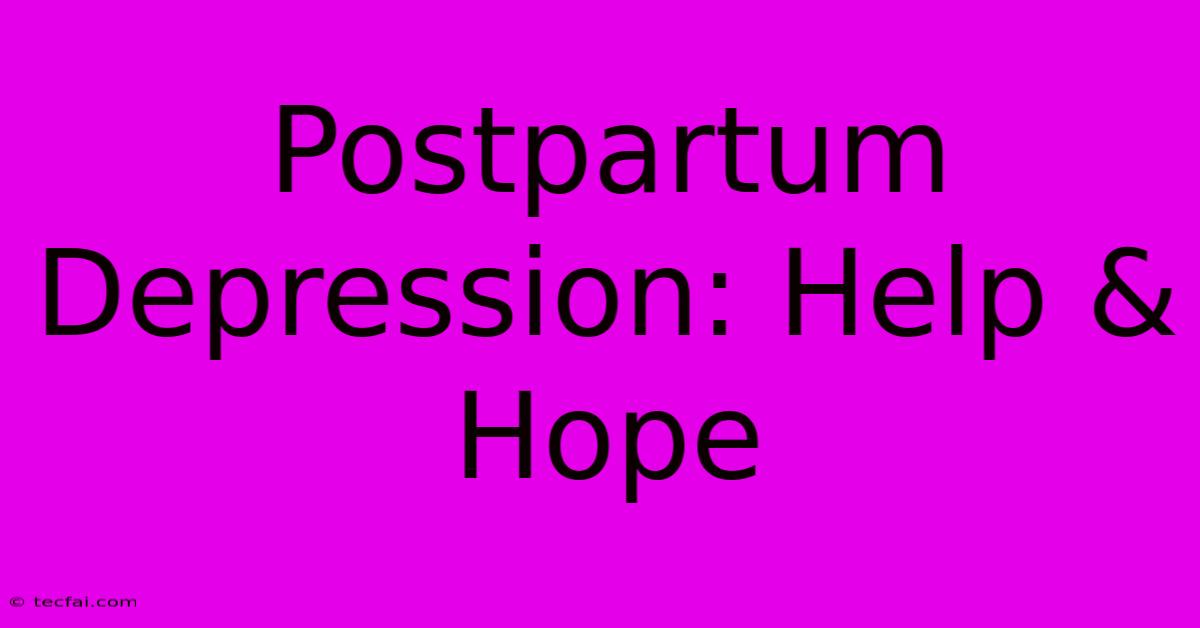Postpartum Depression: Help & Hope

Discover more detailed and exciting information on our website. Click the link below to start your adventure: Visit Best Website tecfai.com. Don't miss out!
Table of Contents
Postpartum Depression: Help & Hope
Postpartum depression (PPD) is a serious condition affecting many new mothers. It's more than just the "baby blues"—it's a debilitating illness requiring understanding, support, and professional treatment. This article explores the signs, symptoms, causes, and importantly, the help and hope available for those experiencing PPD.
Understanding Postpartum Depression
Postpartum depression is a type of mood disorder that can occur after childbirth. Unlike the temporary sadness and emotional fluctuations many women experience (the "baby blues"), PPD is characterized by persistent and overwhelming feelings of sadness, anxiety, and despair. These feelings can significantly impact a mother's ability to care for herself and her baby.
Symptoms of Postpartum Depression
Recognizing the signs of PPD is crucial for seeking help. Symptoms can vary, but common indicators include:
- Persistent sadness or low mood: This isn't just a fleeting feeling; it's a pervasive sense of hopelessness.
- Loss of interest or pleasure: Activities once enjoyed now feel burdensome or unappealing.
- Changes in appetite or sleep: This could manifest as either significantly increased or decreased appetite and insomnia or excessive sleeping.
- Fatigue and low energy: Extreme tiredness that doesn't improve with rest.
- Feelings of worthlessness or guilt: Intense self-criticism and negative thoughts about oneself and one's abilities as a mother.
- Difficulty concentrating or making decisions: Struggling with simple tasks and everyday choices.
- Irritability or anger: Increased frustration and anger, even over minor issues.
- Anxiety or panic attacks: Feeling overwhelmed by fear and worry.
- Thoughts of harming oneself or the baby: This is a serious symptom requiring immediate professional help.
It's essential to note that not all women experience all of these symptoms. Even if you only experience a few, it's vital to seek professional assessment.
Causes of Postpartum Depression
The exact causes of PPD are complex and not fully understood. However, several contributing factors are believed to play a role:
- Hormonal changes: The dramatic hormonal shifts after childbirth significantly impact mood and emotional regulation.
- Sleep deprivation: Newborns demand considerable attention, leading to sleep deprivation, which exacerbates existing vulnerabilities.
- Stress: The physical and emotional demands of caring for a newborn can be incredibly stressful.
- Genetics: A family history of depression increases the risk of developing PPD.
- Previous mental health conditions: Women with a history of depression or anxiety are at higher risk.
- Lack of social support: Insufficient support from partners, family, or friends can contribute to feelings of isolation and overwhelm.
Finding Help and Hope: Treatment Options for Postpartum Depression
Fortunately, effective treatments are available for PPD. Don't hesitate to reach out for help—you're not alone.
Seeking Professional Help
- Talk to your doctor: Your primary care physician or obstetrician is a good starting point. They can provide an initial assessment and refer you to a mental health professional.
- Therapist or counselor: Therapy, particularly cognitive behavioral therapy (CBT) and interpersonal therapy, can help you manage negative thoughts and develop coping mechanisms.
- Psychiatrist: A psychiatrist can diagnose PPD and prescribe medication if necessary. Antidepressants are commonly used to treat PPD and are generally safe for breastfeeding mothers.
- Support groups: Connecting with other mothers experiencing PPD can provide valuable emotional support and a sense of community.
Self-Care Strategies
While professional help is crucial, incorporating self-care practices can also aid in managing symptoms:
- Prioritize sleep: Even short periods of rest can make a difference.
- Eat nutritious meals: Proper nutrition supports both physical and mental well-being.
- Engage in gentle exercise: Physical activity can boost mood and reduce stress.
- Practice relaxation techniques: Mindfulness, meditation, and deep breathing exercises can help manage anxiety.
- Accept help from others: Don't be afraid to ask for assistance with childcare, household chores, or errands.
Overcoming Postpartum Depression: A Path to Recovery
Recovery from PPD takes time and effort, but it is absolutely possible. With the right support and treatment, you can regain your sense of self and enjoy motherhood. Remember that seeking help is a sign of strength, not weakness. Prioritize your mental health—you deserve to feel happy and healthy.
Keywords: postpartum depression, PPD, postpartum mood disorder, postpartum anxiety, baby blues, postpartum recovery, mental health, maternal mental health, treatment, therapy, support groups, self-care, depression symptoms, anxiety symptoms, hormonal changes, sleep deprivation, stress, recovery, hope, help
This article aims to provide comprehensive information about postpartum depression and is not intended as a substitute for professional medical advice. Always consult with a healthcare professional for diagnosis and treatment.

Thank you for visiting our website wich cover about Postpartum Depression: Help & Hope. We hope the information provided has been useful to you. Feel free to contact us if you have any questions or need further assistance. See you next time and dont miss to bookmark.
Featured Posts
-
Namatay Si Yeontan Alaga Ni V Ng Bts
Dec 03, 2024
-
Government Accused Of Recession Delay
Dec 03, 2024
-
San Siro Visit Fuels Milan Inter Transfer Talk
Dec 03, 2024
-
Nhs Dental Crisis Self Tooth Extraction
Dec 03, 2024
-
Ffos Las Horse Racing Tips 4 1 Shot Monday
Dec 03, 2024
